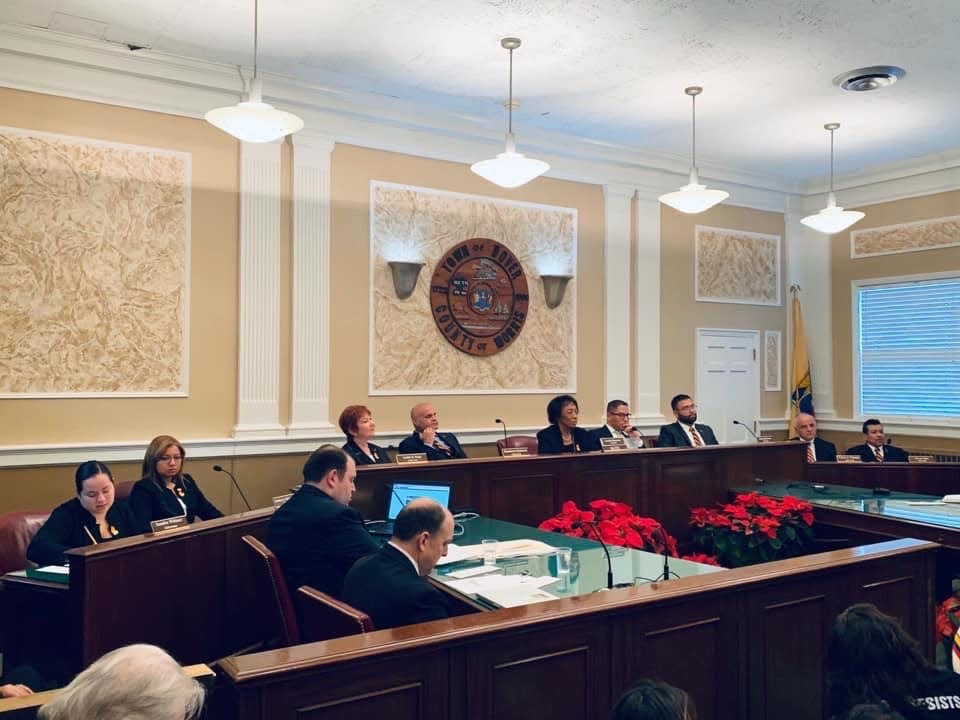NJ's last aldermen are gone as Morris County town switches to gender-neutral 'council'
Dover no longer has a board of aldermen running things. Neither does New Jersey.
The governing body of the Morris County municipality voted by a 5-4 margin on Tuesday to declare itself a "town council," effectively relegating the alderman title to Garden State history. Dover was the last holdout in the state after another Morris town, Boonton, made the same change in 2021.
Rooted in historic British common law, the alderman term − like New Jersey's former name for top county officials, the "freeholder" − carried the implication that the office was restricted to white male landholders.
The "alderman title," derived from the Old English ealdorman, meaning "elder man," is still used in parts of the U.S., including the 50 alderpersons elected to the Chicago City Council.
Tuesday's vote doesn't change the structure of government for Dover and its 18,000 residents. But its symbolism is important all the same, supporters said.
Dover ditches alderman title: 'Words matter'

"The word alderman specifically means a man. On this body today, there are five women present, and only four men present, and we have our first woman mayor," former Ward 3 Alderwoman Karol Ruiz, now known as a "council member," said at the meeting.
"Words matter," she continued. "And tradition matters. But the value of changing the word to council far outweighs the loss of breaking with that tradition. Why should our [title] be gender-specific? Council allows it to be everyone."
Ruiz joined Jessica Cruz, Sandra Wittner, Michael Scarneo and Mayor Carolyn Blackman in supporting the name change. Judith Rugg, Geovani Estacio, Marcos Tapia and Arturo Santana voted against it, without comment.
The renamed council took its message of inclusion one step further, voting 6-1 (along with two abstentions) in favor of a resolution to "stand in support of the LGBTQ+ community by declaring November as Transgender Awareness Month." Tapia again voted "no" and Estacio and Santana abstained.
The resolution carried a promise by the council "to increase awareness as to the importance of love, acceptance and compassion for the LGBTQ+ Community."
Maria Chacon, cofounder of Dover Pride, found the abstentions and Tapias's "no" vote to be "concerning."
"[Tapia's vote] was especially troubling for me, having supported him in his campaign," Chacon said. "How can one vote against inclusion? The resolution, which aims to boost awareness for a marginalized community, has no financial, headcount, or space impact on the town."
Gender-neutral: Boonton eliminates 'alderman' title for gender-neutral 'council member'
Only in New Jersey
Freeholder also is an old English title, predating the American Revolution and referring to a person who owns land free of debt. New Jersey was the only state to use the term to describe elected county officials until Gov. Phil Murphy signed legislation in 2020 requiring all “boards of chosen freeholders” to be renamed as “boards of county commissioners.”
Morris and Bergen counties voluntarily voted for the change earlier that year. Ocean and Monmouth counties were among the final holdouts until the state law took effect in January 2021.
New Jersey's first constitution, adopted two days before the Declaration of Independence, on July 2, 1776, declared that a county representative must be worth "fifty pounds proclamation money, clear estate in the same and have resided in the county in which they claim a vote for twelve months immediately preceding the election."
Technically, this declaration did not specifically exclude women or Black slaves, but because circumstances at the time prevented them from owning property, they were effectively barred from county office.
In 1790, the state Legislature clarified the law to add “he or she,” underscoring its intent to give the vote to male and female landowners alike. But the reform applied to only unmarried women or widows, as married women could not own property, according to the National Park Service.
“African Americans in the state could vote if they met the residency and property requirements,” the Park Service wrote in an online history of Garden State voting rights. “In 1797, the New Jersey government required voters to be free inhabitants. We do not know if enslaved African Americans voted before this law was passed − the property requirements made that unlikely, but no law specifically prohibited them from doing so.”
“As our nation tears down symbols of injustice, we must also tear down words we use in New Jersey that were born from racism," Murphy, then-Senate President Stephen Sweeney and Assembly Speaker Craig Coughlin said in a joint statement announcing the legislated elimination of freeholders. "It’s past time for New Jersey to phase out the term ‘freeholder’ from our public discourse."
William Westhoven is a local reporter for DailyRecord.com. For unlimited access to the most important news from your local community, please subscribe or activate your digital account today.
Email: wwesthoven@dailyrecord.com
Twitter: @wwesthoven
This article originally appeared on Morristown Daily Record: Last NJ aldermen gone, Dover use gender-neutral 'council'

